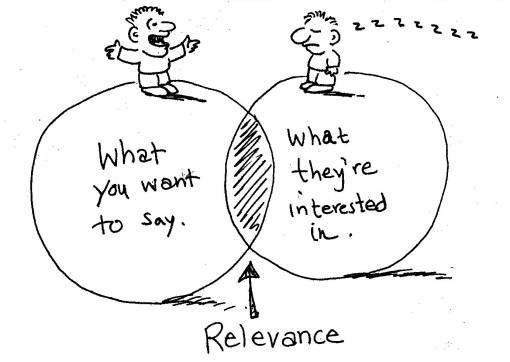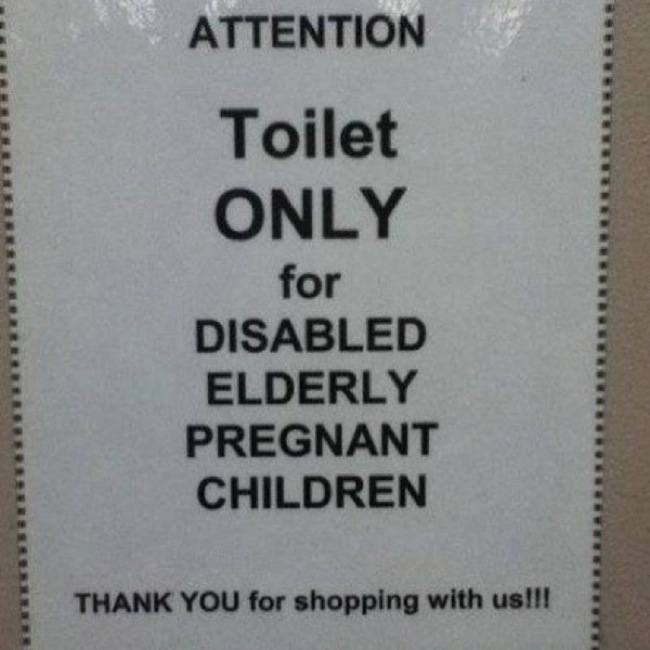In this increasingly electronic and remote society we have, much of our communication is done online. Everything from texts to emails to the words right here are written on a keyboard and sent through Ted Steven’s “series of tubes” to the recipient, and, while it makes us arguably more narcissistic and less endowed with social skills, it behooves one to express himself online, so, today, we’ll talk about 10 ways to write well online.
1. Know your spelling
It’s a serious dick move to call someone on their spelling in order to win your argument, but when someone on the left (which is who we here usually face, either culturally or politically) gets desperate, they are going to reach for anything they can to tear you down, especially if it’s relevant to the topic at hand.
One of my favorites is “Marshall Law.” Although Chief Justice John Marshall was extremely influential in the Supreme Court’s development, and a great American to boot, the term that people usually mean is “martial law,” which is when a standing military is placed in control of law and order as temporary police and judicial systems. This typically happens in times of disaster and invasion.

This includes using the wrong word; unless the property owner really meant to whore out anyone he caught.
The solution to this one is to look up words you do not typically use and make sure you are using them correctly. No one looks more ignorant than someone operating outside of their skill level, and that counts for writing as well. What is insidious here is that the spell checker, if you misspell into a correctly spelled, but inappropriate, word, will not say anything. Watch your homonyms (there, they’re, their; to, too; who’s, whose; your, you’re; etc.)
2. Know your grammar
You’re not going to get gigged on grammar as much as you are on your spelling. It’s a human phenomenon I have noticed from everything to gaming, to industry, to writing, that the person of average skill will talk down to the neophyte, but the person of superlative skill will remain professional and polite. What I mean by this is that the average English speaker has mediocre written grammar, so he or she, while they might want to, cannot correct people on grammar due to lack of their own skill, but will be skilled enough to correct people on spelling alone.
However, despite the fact that you will not be as likely to be criticized, your errors will be noticed by some, so it helps to know grammar and punctuation. I write some damn long sentences in these articles, but even though I try to maintain proper use of commas, conjunctions, and semicolons, I am sure that I have married some subordinate clauses together in a way that would not be received well in Heaven.
It’s outside the scope of this article to provide grammar lessons, but a decent English textbook and good style manual will go a long way. The latter of those two is a work explaining how people writing for an institution (like the Associated Press) should write, and it would cover topics such as how to refer to the publication itself (Return Of Kings, Return Of Kings, ROK, RoK, R of K, etc.)
3. Know your audience and your arena
Return Of Kings (and that’s how I write it from the above discussion) is a small staffed, low overhead business that reaches more people than we should be honestly expected to because of the self-reliance of the authors. Roosh’s philosophy is that you should write about what you know. My gig here is loosely defined as writing about masculine hobbies but, other than that, I can write about what I want, and I try to only write about things in which I have some expertise as do the rest of the staff.
Point being, Winston and Roosh bust their humps to get out multiple articles every day, so they have to edit for content, not spelling or grammar, which is why the occasional error will get through, even, most probably, in this article on the very subject.

This does not matter, as ROK (shortened version, as I referred to it earlier in full name, in italics) is an informal space where we (both writers and the readership) are more concerned about the content over the total correctness of the verbiage. Our writers can use all words of the English, and sometimes French, languages, including slurs and vulgarities, provided they are on topic and relevant, and no one gets upset, as we are all men here. We also write in a colloquial, modern tone, as if we were speaking in person.
However, you do not want to write that way in the workplace, or for professional publication. I’ve got a graduate thesis that is dry as a bone, but it is not meant for entertainment. As you enter more professional writing spheres, you should drop contractions, slang, superfluous modifiers, any controversial references, as well as anything unnecessary.
4. Proofread
Read what you have written multiple times before sending it off. Check for things like repeated words; the paragraph two above this one began with “however,” but I decided I wanted the next paragraph to begin with that word, as I was introducing a contradicting point, and it was removed so I would not begin two paragraphs in a row with the same word.
Check for misspellings, including the ones that the spellchecker did not find, and grammatical errors. Also check for simply using the wrong word in the sentence than the one you meant. Lastly, check to make sure you are not using a “big word” more than once, or, at the most, twice, in your article.

5. Self-edit for clarity and length
While you are proofreading, check for unnecessary fluff. The word count limit here at ROK does me well, as I have to trim some of excess (I’d use superfluous here, but I used it once already in this article) garnishment to get down to a sane length before I destroy attention spans with my verbosity.
Some of my very first articles had better content than my more recent ones, as I spent more time on them before I went weekly in my contributions. They were bigger articles that were aggressively pruned down to two thousand words, as opposed to some that get finished at under the limit and are not edited for length.
6. Know when to stop and come back to it later
I rarely write an article in one sitting. I tend to write better when I am enthusiastic about something, and, when the passion wanes, I will stop and head off to other activities before returning, later, to finish. Still later, I will upload it to the site, then go find relevant and entertaining pictures off Google to finish it, and review it once more how it will look on its webpage before submitting it.
A business analog to this is to never send an email while angry. Always write it (don’t put in the address, as some programs like to send drafts for you, in case you “forgot”) and come back later to review it. You may find that you don’t want to say everything you had written previously, and you now have an opportunity to revise what you will say that you would not have had if you had sent it earlier.
That being said, on this Saturday morning as I write this, I will now go off to do other tasks, and get back to the last four points later.
7. Write from knowledge and thinking, not emotion
Everyone likes to go on a tirade occasionally; they feel good, and maybe entertain some people. But, these rants typically do not have much lasting value, and the writer often wishes he’d made better points.
Even more importantly, someone who is an expert will inevitably come along and trip you up on your facts and reasoning if you did not do your homework and figured everything out first. An English Composition college professor could, no doubt, rip me up on the occasional error on this article, but I know I write fairly decently, so hopefully he’d be forgiving and agree with the general gist of the piece.

The left does this, and it’s a large part of why they look so stupid.
Write what you know. If you don’t know it, learn it before you write it. Don’t base your writings on feelings alone, even strong feelings. Feel strongly about the facts if you want, but ground yourself in reasoning, not emotion.
8. Get a vocabulary
The English language (and I know none other, so this may be true in other languages as well) has a delightful amount of words that are fun to use, but never seem to GET used by the general public. Granted, words that are out of style will mark you as odd, but there is a gray area in there that, if you pull a word from it, your target will be on lesser footing because you used a word that he didn’t know, but should.
Don’t call someone an illiterate idiot; call them something like an nonerudite troglodyte, or a catachrestic philistine, and, not only will you have insulted them, but it will take a while for them to figure it out. That’s just insults, though; if you paw through a good thesaurus, you will learn synonyms and antonyms that will help your writing be fresh and vivid.

Be careful, however, to not get too ornate with your writing for your purpose; remember, know your audience. Also, the English language is odd, no two words, even though they may be synonyms, mean exactly the same thing; they’re close, but not exact. Knowing this difference is, to quote a character in a favorite novel of mine, not the difference between lightning and the lightning bug, but the difference between the lightning bug and being STRUCK by lightning.
9. Use wit and humor to your advantage
In this sphere of the internet, a good pop culture reference or wry commentary will help set the stage for the tone of your piece, although I will admit listening to the Series of Tubes video above made me realize how far the net has moved on in ten years, so maybe it’s a little dated.
Funny stories will also help make your point. I refer you to my colleagues Mr. Sharpe and Mr. Yader for what I consider to be the most hilarious articles on this site.
10. Cite other works
You want to cite other works for at least three reasons. Firstly, you are not going to have the space (and your readers will not have the time) to read everything you would want to say on the subject. This is why we pepper links through these articles so you can read more if you like (especially the big one saying “Read More” at the bottom of each piece).
Secondly, you want to borrow the thunder of previous works to help make your point. I’m not feeling particularly hilarious at the moment, but, since I pointed you at some good articles above, the point was made for me, and we could move on as I crash through 1850 words here on my way to 2000.
Lastly, as your stuff is fact based, and we’re not in a bubble chamber, you should link to the work of others to provide legitimacy. It’s exactly an evolved, informal way of listing your references, just like a more formal work would do theirs.
Conclusion
Writing is important in this digital age, and it follows that doing it well is also important. Know the language, know your audience and your subject, take a couple passes at writing it and a few more for proofreading and editing, adjust for the tone of the piece, and, finally, add in some references so your audience knows that what you’re saying is backed up by other people and not just hot air.
Read More: My 3 Greatest Mistakes Writing For Return Of Kings
“Eschew Surplussage” – Mark Twain
A bumper sticker I once saw that gave me a good laugh:
‘Eschew obfuscation’
Writing and reading are two halves of a whole. If you only read garbage, you will only be capable of producing garbage. Seek that which is worth emulating.
Hence why I read Mark Twain and P.J. O’Rourke and, at times, Dave Barry.
And sometimes we must suffer PJ Clark…
Hemingway for me, you can keep your $10 words
Reading for pleasure is something many my age used to think of as weird. Joke is on them, at least I sound more educated than the average bear when I write.
Because you sound more educated, I kindly give you an upvote.
Henceforth all ROK readers & contributors will eventually become literate, courageous and critical thinkers.
There was some sarcasm intended but my english is indeed at a relatively low level.
Hahaha those sound like decent goals for anyone right about now…
I second you on this one.
Expressing with great style of speech and writing often stem from reading (or hearing) from people who express themselves with great style. (Moreover for the stuff we talked about in another article).
And now, the more you read my post, the more you find it relevant 😉
We have the dumbest men on earth but women take the cake.
All fat. Every single one.
Maybe the old bag was the only one less than 30 lbs overweight.
How can they be so fucking dumb? I can’t believe someone marries these things. However back to the point. We should end the women’s suffrage. These things vote, you know.
To their defense they’re mixing up suffering with suffrage. oops.
I love this bit….
With regards to writing not from emotion, this goes back to the teachings of Aristotle. There are three elements of human thought: pathos (emotion), logos (reason and information), and ethos (ethical thoughts, which are not quite pathos nor logos).
The written word is almost entirely unable to convey pathos, which is primarily conveyed by tone, cadence, and body language. This is the reason behind Poe’s Law, which states that in written form one cannot distinguish between truly radical rhetoric and parody.
Mastery of language is a powerful asset. In highschool there was a regional multi-school essay contest. We had a good two weeks to write the paper. I wrote mine the night before it was due and finished up the day it was due in study hall. I won first place. I pissed off a lot of people with better GPAs than me, especially several girls who had written impassioned feminist tirades.
I never got straight A’s nor did all the busy-work that the so-called overachievers did, but when it came to head-to-head competition I reigned supreme.
We won’t have any homonyms around here matey – this is ROK! Only heteronyms are acceptable around these parts you know..
Unlike Oscar Wilde you are clearly heterogeneous
Just found out that heteronym IS actually a word. My lesson for today 🙂
I try to be heterogeneous too..
So what would lead you to look up the term heteronym? Did someone hit you with a lead pipe? 😉
Actually I do enjoy a game of Clue / Cluedo
I must say that instructing some of the troglodytes on here in the intricacies of heteronyms is akin to teaching a sow how to sow. 😉
http://i0.kym-cdn.com/photos/images/facebook/000/756/580/34c.jpg
AAAAAAGGGGGHHHHHHH!!!!
DAMN YOU!!!!!!!!!!!!!!!!!!!!!!!!!
1. Keep your writing terse and to the point. Hemingway was a precise writer. Don’t gas on and on.
2. Don’t use “fancy words”. It will not ring true to the reader’s ear and it will appear like an affection or “putting on airs”. Or it can blaze like a neon sign ” I’m a douchebag” too. If you ever see a modern writer use the word “fortnight ” you can bet they are monstrous twat.
3. “The best writers are readers” . I think Steven King said that but not sure. To improve your writing , read.
3. is probably the best tip for improving one’s writing.
What does this have to do with the manosphere?
Sounds a bit gay to me.
Dude, you were all about tranny ladyboy Asian prostitutes on another thread and how you’d do one.
Maybe your critique isn’t, you know, valid?
“There’s that fag talk we talked about” https://uploads.disquscdn.com/images/a4b8a9657931fa2fcac70bf00c84b59492cd74f6fb62bf93e0479e5808b18e01.jpg
Lmao …
Maybe it’s the vast cultural heritage he’s been exposed to since his youth.
The chaos of diversity eventually had to expose such thinking…
Damn! That was 230 grains of Hornady Critical Duty straight through heart.
because communicating via great and correct style of writing is gay to you ? ok.
11. Don’t expect shit in terms of decorum from folks on the internet, and you’ll never be disappointed.
I have not read this in a long time, but helpful advice nonetheless.
The Elements of Style
https://www.amazon.com/Elements-Style-William-Strunk-Jr/dp/1557427283
Maybe this is Strunk’s son Strunk Jr but the original Strunk and White is a classic and required reading. Steven King’s “On Writing ” is great… Good mention…
Luke hits some very important beats here, in particular the one about coming back later. You should ALWAYS come back later when you write anything long-form. Always wait overnight then re-read your last draft before hitting Post or Send or whatever. You’ll almost always find edits to make.
Another REALLY REALLY important thing for long-form writing success: THE OUTLINE. A great outline all but guarantees a great piece (great in and of itself, even if the subject is shit). Here’s a link to a phenomenal guide to outline creation by Dr. Jordan Peterson:
https://www.google.com/url?sa=t&source=web&rct=j&url=http://jordanbpeterson.com/docs/430_docs/Template.docx&ved=0ahUKEwjL4ZiL-bHTAhWGPiYKHQxrAUEQFgglMAE&usg=AFQjCNHe0UXxbrFqqCsUnK9rdgQpePGrDQ&sig2=_jLVtG3iaUmz_ofpz5SE2g
(Link downloads the doc directly, hopefully no viruses. Use at your own risk)
Great article Luke. Keep cranking them out!
So many people today know almost nothing about spelling and grammar. This article is necessary.
yeh most of us dont talk good neither!
specially from Missippi
It behooves us to learn English words so we can write cromulently.
Try talking like that at your local jiffy lube or hells angels club .
Such thinking embiggens the smallest among us!
“Don’t use a five-dollar word when a fifty-cent word will do. ” — Mark Twain
Here’s an indispensable online manual of style that will really help a writer of virtually any level of proficiency, up his overall game in a major way; this is a “must bookmark” site for all writers:
http://www.chicagomanualofstyle.org/16/contents.html
I didn’t expect this article to bring such joy. We get to discuss why the AP Stylebook is complete shit! Unfortunately, I’ve not much time this evening so this examination will be brief.
First, to follow the AP guide, you must never refer to Caitlyn as Bruce, nor call him a him. Same with Mr. Chelsea Manning. You must stay abreast with the latest whims of everyone’s sex identity.
Even worse than that, according to the AP style guide, you are permitted (and even encouraged) to drop the Oxford comma. If anyone in your family were to not use the Oxford comma, you should disown them.
I know nothing about writing. Now back to vagina and kratom .
Words are only useful for people who have something to say. But boy oh boy am I glad I’m English speaking. I can’t even read this:
http://frontiermyanmar.net/sites/frontiermyanmar.net/files/styles/content_full_width/public/myanmar-gazette-2.png?itok=G3Kpfk-N
I have long suspected that languages with large complex letter systems were a protectionary device for the native tongued and are specifically designed to keep outsiders out.
http://www.omniglot.com/images/langsamples/udhr_burmese.gif
I be like “huh?”. Wtf that say?
Its all mumbo jumbo in the article, i couldn’t even understand a word from it actually although i know its Burmese.
that looks like the Voynich Manuscript
Myanmar is far separated from Northern Italy/Liechtenstein where the Voinich book was found. Though it does look eerily similar to the Burmese (Abugida) writing system which is very old and derived from Sanskrit.
http://beinecke.library.yale.edu/sites/default/files/styles/node_scaled/public/1006107_quarter.jpg?itok=ivHmrNpl
(The parent language to Sanskrit?)
I’m surprised no one has deciphered the Voinich manuscripts. If a modern giant mother bitch computer can crunch Navajo inside and out, then the ‘mystery’ Voinich writing should be a cinch. The Voinich manusciipt has enough pages and repeting symbols to make a base dictionary for the language for starters. It’s from the 15th century and was most likely penned by someone in a trance hallucinating or under celestial visitation like Joseph Smith. It doesn’t appear to be a prophetic or religious diatribe like the gold plates of mormon which were supposedly translated by the man. Perhaps the Voinich author died before he could translate the work. Or maybe the work was accidentally lost or dropped by space visitors in a hurry reboarding. It’s too detailed to be a forgery, organized like an encyclopedia into illustrated sections covering astronomy, cosmology, recipes, botannical curios, herbs, pharmacology and other natural and scientific areas. Maybe some illiterate, autistic rainman somewhere who can’t speak a word knows how to read the strange unknown Voinich language. They should offer a prize to whoever can unscramble and translate the work. I’m sure many earthly or otherworldly secrets and revelations are contained in the pages.
I meant the writing looks similarly impenetrable – looking at pic as a comparison there are some physical similarities but clearly there isn’t much in the way of similarity.
The voynich manuscript is indeed tantalising, and I agree it is strange that no-one has been able to decipher it. I seem to remembersomeone succeeded a few years back, but then others disputed the the claim. https://www.beds.ac.uk/news/2014/february/600-year-old-mystery-manuscript-decoded-by-university-of-bedfordshire-professor
The least interesting but possibly the most probably theory is that the whole thing might be made up or meaningless text – not a mean feat in itself but frustrating if you’ve committed emotionally to the deciphering of the book. I don’t think that would necessarily make it a forgery as such – the point could be the illustrations. The point might have been to make it look something like a cryptic medieval manuscript
Another good one is the hypnerotomachia poliphili, which was the subject of a thriller called the The Rule of Four a few years back
https://en.wikipedia.org/wiki/Hypnerotomachia_Poliphili
I studied littra-choor. Dames don’t care ’bout that Pointdexter egghead stuff. I learned more ’bout game from just bummin’ around the country as a self-appointed “road scholar” than in years of school.
That postdoc from Yale is still hangin’ on the wall gathering dust years later.
‘Road scholar’ or rogue scholar?
Who, this guy?
https://s-media-cache-ak0.pinimg.com/736x/7e/83/43/7e83439716a308c0b373fcfc04e75d09.jpg
Six founder Marcinko, bad ass of bad asses.
RoK needs to stop publishing this gay shit from effete wankers!`
(excuse me for not being polite, It’s the afternoon so I’m pissed)
Dear Roosh, you need to recognize plonkerss who post just for the sake of getting clicks, and ban them from your site. Kyle is one. Luke is another of these silly billys. They contribute nothing worthwhile. They are not suitable contributors to your website.
But what do you really think?
Agreed. Advice on writing from a poor writer diminishes the credibility of everything else on the site.
omg this post has changed. It brilliantly demonstrated the correct use of the word ‘cunts’ before. So much for free speech.
What the hell is wrong with you?
A LOT of people that visit this site do a bit of writing themselves, and could always use the tips.
AND WTF IS A PLONKER?!?!?!?
there is more to increasing your SMV than memorizing pickup lines. How many “day game” articles do you need?
You’re right Jim, we men need more creative writing tips, along with a cooking section, more skin care stories, and a manly fashion section.
Hahaha, I think they were right to ban you for this.
You can’t go on a neo-masculine site, tell them to ‘man up’ and expect your account to survive.
My byline bio up there says: “He writes for Return of Kings as a leisure pursuit and an attempt to do his part to help reverse the slide into moral decrepitude of modern society.” That should imply that I’m not a professional blogger who posts just to get clicks, and that I write for Roosh for free because I approve of his cause, because both are indeed the case.
hlpe
Oh, there’s an article I don’t enjoy, I should just bypass it and go look at a different one…
Wait, what’s happening?!?! Can’t bypass, must type angry words on the internet!!!!!
REEEEEEEE!!!!!!!!!!!!!!!!!!!!!!!
http://i0.kym-cdn.com/entries/icons/original/000/017/318/angry_pepe.jpg
Great tips!
Thanks.
Somewhat related…have decent or great handwriting. If I have to struggle to read your shitty scrawl, Im going to call you out on it or toss it. People say it doesnt matter, but I witness people comment on good handwriting constantly when they read it. Saw a black kid hand in a survey yesterday & the old bastard who took it said, “Damn you got purty handwriting!” Nothing gets me pissed faster than trying to read important work-related numbers from an adult hand & decipher at the same time….oh & pussies who write tiny.
True, that is becoming a lost art. Especially if you are writing something that will be read by others.
That is absolutely correct. Having a beautiful hand really stands out in this day and age. Women in particular notice and it’s usually “You have such pretty handwriting for a man.” I almost invariably respond, good naturedly of course, “That’s a sexist remark!” Back when I was in my twenties, I got the bright idea of writing my résumé out in script. When I was called in for an interview everything went great until I got to the hiring manager. He asked me who wrote it for me. I said “I did.” He responded “No, who wrote this out in longhand.” I repeated “I did.” He said “I was afraid of that. I can’t hire you. You’ll get bored here and quit.” I went back to a standard printed format after that.
Who writes by hand any more?
SMS, email, or print and present.
Simp.
Good writing leads to good speech. Good speech leads to an intelligent demeanor. An intelligent demeanor leads to an improved SMV. An improved SMV leads to better quality poon.
It is so simple and easy!
Pro writing tip: if you must write a complaint letter, mention something positive before your complaint. Eg “I’m a big fan but…”
My professional writing class in college has been damned useful. Pity the college is gone now…
Luke, you nailed it. Every single point got into the true substance of writing. Solid article.
Gotta reiterate what Taignobias and Gladius point out-
To be a better writer, read. Read fiction (in multiple genres) and non-fiction, academic papers, a variety of authors, from a variety of eras. Exposure to different styles, phrasing, and techniques will make your own compositions better. Good tip about citing other works, the more you read the more works you can cite. Also, the more you will be able to understand the citations in the works you read.
(Tip for professional emails and complaints/letter to customer service. BLUF – bottom line up front, when you’re writing to someone who views a lot of correspondence, let them know what you want from them first– decision on something, refund on a purchase, some other action. Let them know why this is important to/directed to them. Giving background first, especially if it’s long, can result in them just discarding it. If you put the BLUF in first, they read the background in the context of it expanding on the action you’re seeking and how it affects them).
“behooves one to express himself online”
ONESELF. A surprising faux pas at the beginning of such an article.
B minus. See me after class.
Derivation from standard assuming a male audience.
Let’s eat Grandma vs. Let’s eat, Grandma.
Commas save lives
Yes, ambiguity can kill!
https://uploads.disquscdn.com/images/463a690965cdefd0bebc6778fd6af460221c07294d2739b9f1b77c8f627907a2.jpg
But you gotta have good book learnin’ to know good words!
Mebbe ah kin lurn him sumpin! Ahm veri ‘sprresiv.
Well done!. Not only do I believe it is a very important general topic, it is important to this sphere in particular.. Any man who desires to be taken seriously, would do well to heed the advice in this article. Regardless of how intelligent you are, you will project ignorance if you write poorly. I am curious about you (your?) beginning a paragraph with conjunctions? I was taught that it is absolutely forbidden. However, I simply cannot obey this rule. It seems appropriate to begin some sentences with “And” or “However” etc. And it flows nicely! I didn’t write those last few sentences to provide examples. It is just a style I am comfortable with.